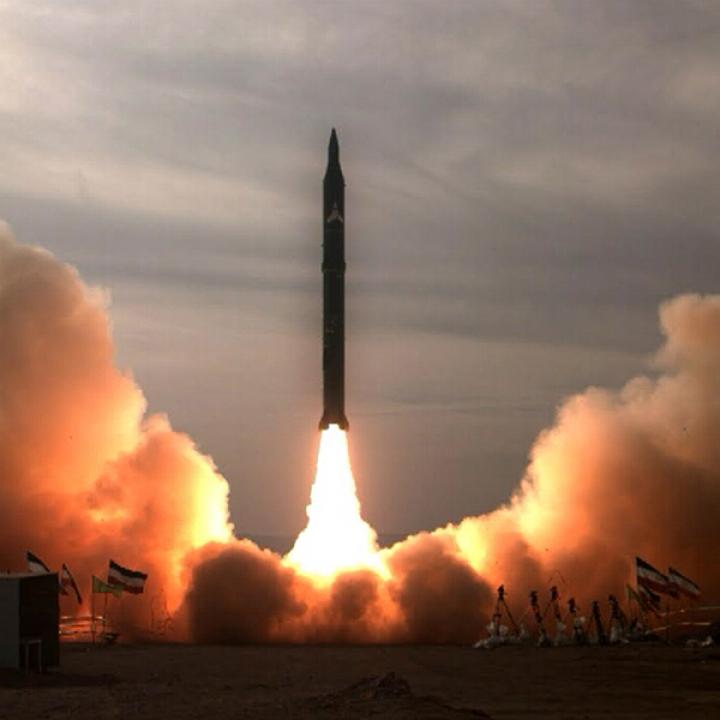
- Policy Analysis
- Articles & Op-Eds
The Risk in Lifting Sanctions, and Pressure, on Iran's Weapons Activities

Tehran's longstanding arms trafficking and missile research efforts highlight the problem with wholesale removal of weapons restrictions.
Gen. Martin Dempsey, the chairman of the Joint Chiefs of Staff, told the Senate Armed Services Committee this month that "we should under no circumstances relieve pressure on Iran relative to ballistic missile capabilities and arms trafficking." Yet under the Iran nuclear agreement announced last week and endorsed Monday by the U.N. Security Council, sanctions on conventional arms are to be lifted in five years and missile sanctions in eight years (possibly sooner under certain conditions). And Iran appears to be making no promises to limit its activities in either area.
The Obama administration has said that the negotiations aimed only to limit Iran's nuclear activities and that sanctions targeting Iran's missile program and arms trafficking were essentially punishments for non-compliance over nuclear issues. It has also said that the terms of U.N. resolutions obligate the international community to lift the arms and missile sanctions once a deal is reached on Iran's nuclear program. Secretary of State John Kerry said Sunday that the extension of arms and missile sanctions for five or eight years was "thrown in as an add-on," as though they should be considered a win for U.S. negotiators. But these arguments don't hold up.
U.N. Security Council Resolution 1737 states two purposes in its preamble: "to persuade Iran to comply...with the requirements of the IAEA" and "to constrain Iran's development of sensitive technologies in support of its nuclear and missile programmes." In reports on Iran's noncompliance with its nuclear Non-Proliferation Treaty obligations, the International Atomic Energy Agency has included concerns related to missiles, such as Iran's "studies...related to the design of a missile re-entry vehicle."
Iran has tried for more than a decade to have restrictions on conventional arms and missiles lifted. A Jan. 17, 2005, proposal from Iran to France, Germany and the UK demands that the restrictions be dropped; a counterproposal later that year omitted the clause. The U.S. and its allies long considered Iran's nuclear program, ballistic missiles, and proliferation activities part and parcel of a single threat. The fear was not merely that Iran would develop fissile material for a bomb but also that Iran would develop the means to deliver that bomb and share sensitive technologies.
The notion that U.N. Security Council resolutions require Western allies to drop the arms and missile sanctions is an unpersuasive theory. Iran did not comply with these resolutions: It never satisfied the Security Council's core demand that it suspend uranium enrichment. And the July 14 agreement does not require Iran to meet the criteria the Security Council imposed for terminating sanctions: that Iran has "fully complied with its obligations under the relevant resolutions of the Security Council and met the requirements of the IAEA Board of Governors."
The Obama administration may believe that a shift in standards was necessary to reach agreement this month and avert an even worse outcome. But it makes little sense to argue that we must hold ourselves to the letter of U.N. resolutions while not holding Iran to the same.
All of this might be academic if Iranian missile activities and arms trafficking did not pose such a threat to U.S. interests. Iran has the region's largest, most advanced ballistic missile arsenal and is thought to be working on intercontinental ballistic missiles. Defense Secretary Ashton Carter said this month, "The reason that we want to stop Iran from having an ICBM program is that 'I' in 'ICBM' stands for intercontinental, which means having the capability of flying from Iran to the United States." Nuclear weapons require delivery systems, which is why Iran's ballistic missile program would appropriately be part of a nuclear accord.
Iranian arms trafficking to Hezbollah, Hamas, the Taliban, and others threatens stability in the Middle East. Hezbollah's attacks on Israel in 2006 were carried out using Iranian rockets and missiles. Conflicts in Yemen, Gaza, and Syria are fueled by Iranian arms, and such Iranian intervention feeds Sunni grievances that benefit the likes of the Islamic State.
As Iran develops more advanced missiles and more sensitive nuclear technology, these capabilities, too, could be shared. The U.S. does have other authorities to interdict arms shipments to terrorist groups, as President Obama has noted. But interdiction requires having intelligence and opportunity, and the latter often involves depending on the will and capacity of Iran's neighbors to assist. These tasks would be far easier if the arms are prohibited from reaching Iran in the first place.
The Obama administration may feel that it had no choice but to accept the phasing out of sanctions. But this argument should be made on its own merits. The notion that we never sought such limits or were obligated to remove the sanctions doesn't hold up. If the sanctions are fully lifted without Iran pledging to cease or limit its arms trafficking and ballistic missile activities, the next U.S. president will be left to find different options -- likely more forceful or less effective -- to counter Iranian behavior.
Michael Singh is the Lane-Swig Senior Fellow and managing director of The Washington Institute. This article originally appeared on the Wall Street Journal blog "Think Tank."
Wall Street Journal



